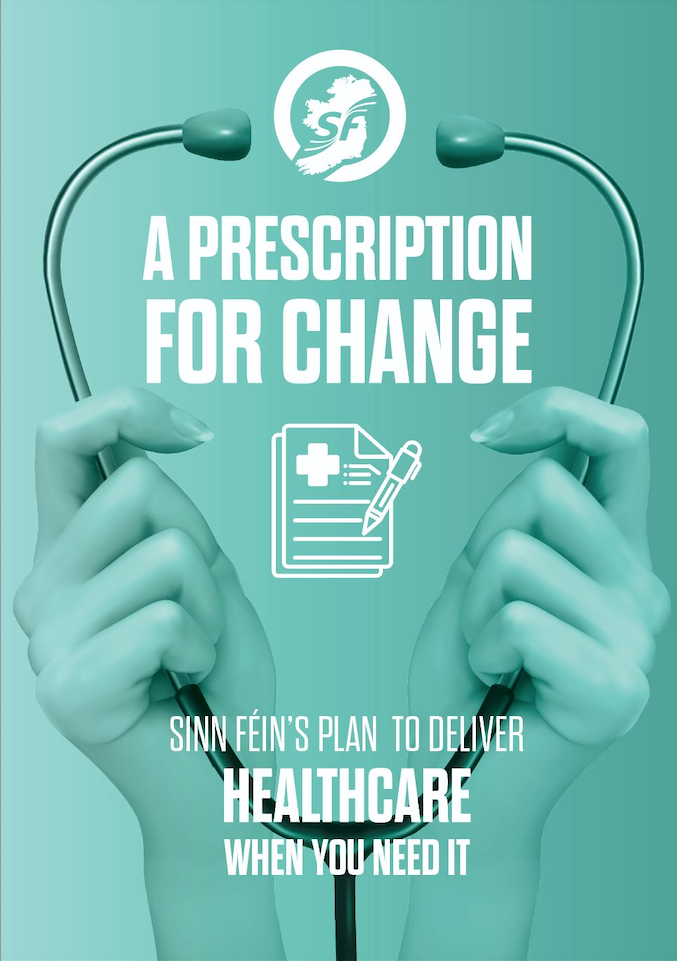
A PRESCRIPTION FOR CHANGE
10. Safe Staffing for Safer Healthcare
Fairer, safer and more efficient healthcare
HEALTH PLAN HOMEPAGE
UNIVERSAL HEALTH AND SOCIAL CARE
LOCAL HEALTH AND SOCIAL CARE SERVICES
HOSPITAL REFORM
MENTAL HEALTH
DELIVERING ON RIGHTS FOR DISABLED PEOPLE
STRATEGIC IMPROVEMENT PROGRAMMES
AGING AND OLDER PERSONS CARE
TACKLING ADDICTION, EMPOWERING RECOVERY
SAFE STAFFING FOR SAFER HEALTHCARE
ACCOUNTABILITY AND REFORM
OTHER KEY INFORMATION
Safe Staffing for Safer Healthcare
Sinn Féin would plan for 40,000 additional health and social care workers by 2030. They are needed to safely staff services, deliver reform, fill vacancies, reduce pressure on existing staff, and improve services. To achieve this, a Sinn Féin Minister for Health and Social Care would lead a campaign to engage healthcare workers who left the health service or who left Ireland, listen to their experiences, and implement the changes they need to see across the health service. We would mandate conversion of 34% of agency hours into direct employment, which equates to approximately 3,000 full-time posts. We would work across Government to address the social crises in housing and the cost of living that are preventing ordinary workers and young people from establishing security.
Sinn Féin would double undergraduate places and give a job guarantee to all health and social care graduates. We would deliver a fair deal for students and increase supports for those who are training and working in frontline posts. This bursary would be in recognition of the work that they do, their need to be supported economically while they train, and that this burden falls unfairly on hard pressed families. We would ensure a seamless transition to work in the public sector for those who want it. It makes no sense to be investing in educating thousands of young people, only for them to emigrate because of housing costs or arbitrary recruitment embargoes.
We would significantly increase specialist training places and undergraduate places to increase opportunities for domestic students in line with health needs. We recognise that graduate entry to medicine and health and social care professions is increasingly common. We would initially extend the Free Fees Initiative to cover Graduate Entry Medicine and review coverage of other entry points to the health and social care workforce.
Sinn Féin would establish a cabinet committee on workforce planning with a sub-group on health to implement a health workforce strategy. We would work with workers to move as much of the health service as we can to extended working days and, ultimately, a 7-day health service. This will require a substantial scaling up of staff, but would achieve far greater value-for-money and output from existing and planned infrastructure and machinery. To put this in context, a normal 9-to-5, 5-days a week roster equates to 40 hours, and 8-to-8, 7-days a week is 84 hours. Efforts have been made in the past to extend work hours for radiographers, but these have failed due to insufficient staff resources throughout radiology departments. When a doubling of staffing is required, we cannot expect already understaffed radiology departments to perform 100% more work with just 1% more staffing. Every department should have an established evidence-based staffing level to meet the care demands expected of them.
The Government’s Pay and Numbers Strategy for the Health Service is a recruitment embargo by another name. Staffing levels have been determined by historical budgets and piecemeal service development, not through a calculated determination of need. The Government has increased patient and staff safety risks in frontline services to make up for financial mismanagement. For example, according to the INMO approximately 2,000 nursing and midwifery posts were abolished because they were vacant on 31 December 2023 – not because they were not needed by frontline services, but because of arbitrary recruitment caps on the HSE imposed by a Government unable to control spending. Fórsa have said that dysfunctional spending in the HSE is diverting funding to expensive agency staffing while at the same time removing vacant posts from frontline services. According to SIPTU, there is a 30% shortage in radiation therapists, leading to an estimated 120 less cancer cases being treated a day because cancer treatment machines idle and underutilised. There are 84 less HSE Home Support Care Assistants despite growing demand for home care. The abolition of vacant posts means that other staff must take up additional responsibilities on a permanent basis without recognition for that work. The HSE has not shared data, with trade unions or the Dáil, on the number of previously funded and approved posts which have been essentially deleted from the workforce because of the Pay and Numbers Strategy. This has led to major trade unions representing most healthcare workers to ballot for industrial action over unsafe staffing. Sinn Féin would not implement dangerous, reckless, and irresponsible recruitment embargoes.
Many professions feel they have more to offer. Sinn Féin would enable health and social care professionals to practice at the top of their licence. We would make greater use of specialist and advanced practice grades, provide opportunities for upskilling, and increase interprofessional collaboration. Many allied health and social care professions, such as psychologists, are still unregulated by CORU despite the legislative basis having been provided in the Health and Social Care Professionals Act 2005. There are several professions which are unregulated or seeking changes to regulation. There are many outstanding labour disputes, including long-running disputes such as for medical scientists, which we would address through a cooperative approach and by honouring commitments.
Immigration and emigration can play positive roles in our health service. International recruitment is essential for filling skills gaps, and many Irish healthcare workers benefit from training or working abroad. The issue is that many Irish emigrants are now driven abroad by the housing crisis or see little prospect or purpose in moving home. The cost of housing and living in Ireland are major barriers to Irish people who want to stay or return, and international professionals looking to work and live in Ireland.
Sinn Féin would enact the Patient Safety (Licensing) Bill to apply improved safety regulations of hospitals including safe staffing levels. Occupational health and wellbeing are major concerns for many workers. The high level of assaults against healthcare workers, the brunt of which is borne by nurses, is an unacceptable risk. Similarly, complaints regarding wellbeing, harassment, and bullying need to be addressed robustly. All unions report significant negative mental and physical health impacts on workers from their working arrangements. The Health and Safety Authority will need to be properly resourced to tackle issues within the HSE. The HSE needs to be held accountable for improving standards. Workplace culture is often cited as an issue. Ensuring that healthcare workers are better supported has been a consistent priority for Sinn Féin.
Sinn Féin Will:
Plan to recruit 40,000 healthcare workers over 5 years, and maximise domestic training, attracting Irish workers home, re-activation, and international recruitment to achieve this
Give a job guarantee to health graduates and deliver a bursary scheme which recognises work done on clinical placements
Lead a campaign to engage healthcare workers who left the health service or who left Ireland and implement the changes they need to see
Mandate a 34% reduction in agency staffing and increase direct employment
Legislate for safe staffing levels and enact the Patient Safety (Licensing) Bill
Establish a safe staffing framework that applies across all appropriate grades
Establish staffing and capacity requirements for a 7-day health service
Double CAO entry places for medicine, nursing, and health and social care courses, significantly expand access to medicine for domestic students, and extend the free fees initiative to Graduate Entry Medicine
Fund a 50% increase in specialist medical training places and more in GP training places
Significantly increase clinical, counselling, and educational psychologist training posts
End pay disparities between core service providing Section 39 organisations and the HSE
Increase advanced nursing practitioners to 5% of the nursing workforce, and fund 500 more clinical nurse specialist posts
Enable professions to practice at the top of their licence and make greater use of specialist and advanced practice grades across professions
Establish a cabinet committee on workforce planning with a sub-group on health to oversee a multi-annual health workforce strategy
Implement the recommendations of the Taskforce on the NCHD workforce
Publish the independent review of the radiation therapy profession
Complete Health and Social Care Professional regulation with CORU
Develop career progression for healthcare assistants
Increase use of reciprocal recognition of professional registration North-South and facilitate easier transfer of qualification and professional registration
Engage with healthcare professionals at home and abroad to improve working conditions and retention
Increase security in hospitals in line with capacity pressures
Fund the establishment of a Health and Social Care Unit in the Health and Safety Authority
Hold the HSE accountable for improving workplace standards and culture, increase occupational welfare supports, and ensure that healthcare workers are properly supported in dealing with stress, burnout, and harm
A Prescription for Change - Sinn Féin's Healthcare Plan
Sinn Féin has the plan, vision, and determination to deal with the big challenges in healthcare. Our plan sets out in detail how we will deliver better access to healthcare when you need it, improve access to a GP when you need one, and end the crisis in our Emergency Departments.
Our plan will transform your experience of our health service and to deliver fairer, safer and more efficient healthcare.


